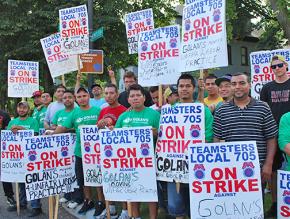Golan can’t move without us
reports on an ongoing strike at a moving company in Skokie, Ill.
WORKERS AT Golan Moving and Storage in Skokie, Ill., say the company has been mistreating them, ripping them off and ignoring their health and well-being for years. On July 28, more than 60 workers at Golan walked out on strike, saying "no more" to wage theft, abusive treatment and the company's refusal to respect workers' right to bargain collectively.
At Golan, workers had no guarantees of wages or even work. Even the most senior employees were never certain if they would have work when they showed up at the crack of dawn. Instead, the only guarantee was a free cup of coffee during the three-hour wait before an owner or manager--who might not even know a worker's name, but instead referred to them by their employee number--told them whether or not they'd be working that day.
Recently, in what workers say is an attempt to crack down on union organizing and head off the threat of a strike, Golan management is said to have threatened some employees--in particular, college-age immigrants who are in the country on J-1 visas (a visa program meant to "promote cultural diplomacy," but which critics say frequently provides U.S. companies with cheap and highly exploitable labor).

In an election last December, the Golan workers voted 66-11 to join International Brotherhood of Teamsters Local 705. Interestingly, when it became obvious that the workers were going to be joining Local 705, the company that had denied raises for so long suddenly found money to give everyone an increase.
Other significant concessions have been won since the workers unionized. But after four months of Golan management canceling and refusing to meet with union representatives, and with more than 40 unsettled issues still on the table, the workers had had enough--and walked out on July 28.
ON THE picket line, workers were eager to explain why they decided to form a union in December.
At the top of the list of grievances was wage theft. One worker explained that if he misquoted an estimate to a client, he could lose up to $500 from his paycheck. If any property was damaged during a move, workers at the job would be held responsible and forced to pay up--an especially ludicrous policy given the fact that even small moving companies have insurance that cover damages up to a certain amount. Some workers reported that wage theft was no longer as prevalent since joining the union.
Safety and health care are also on the list of grievances. Marko, a 23-year-old college student from Serbia working on a J-1 visa, described riding his bicycle eight miles to get to work and waiting three hours at the company's office to find out if he would have any work that day--only to be turned away. After injuring his ankle during one of his long bike rides to work and missing a day, he says that he was "punished" by management by being denied work for over a week.
Employees say this is the standard practice at Golan. Knowing that you will be denied work if you take an unpaid sick day forces many workers to work with injuries--though in an attempt to maintain some basic human decency, workers say that management sometimes does allow injured and sick workers to take "lighter" moving work.
Workers say Golan also doesn't believe in providing health care for its workers. While a concern for any worker, lack of health care is a particular worry for those in the moving and storage world, where the odds of an on-the-job injury are high.
Giovani Fernandez said he joined the union and decided to walk out on July 28 because he wanted to not be "pushed around" any more:
Everyone everywhere is now a temp worker, and everyone is getting pushed around. A union can stop that and fight back. Everyone should join a union. Without a union this would not have been possible--the raises and the stopping of the stealing of our wages.
The strike is continuing, and Golan has kept up some operations by maintaining a small workforce, mostly made up of international students in the country with J-1 visas. Striking workers say the workers crossing the picket line have been lied to by Golan management, and told that they will lose housing and be deported if they strike.
Those on strike are trying to convince those still working of the necessity of coming out and standing with their fellow workers on the picket line.
Striking workers are also following the Golan moving trucks to the residences of the people they are moving--and picketing both at the company's warehouse and at the homes of people who continue to hire Golan.


